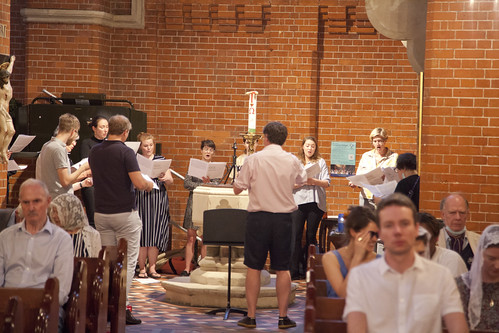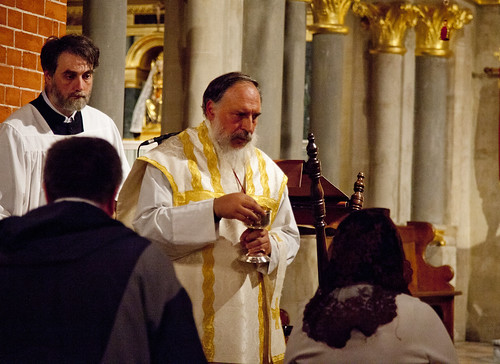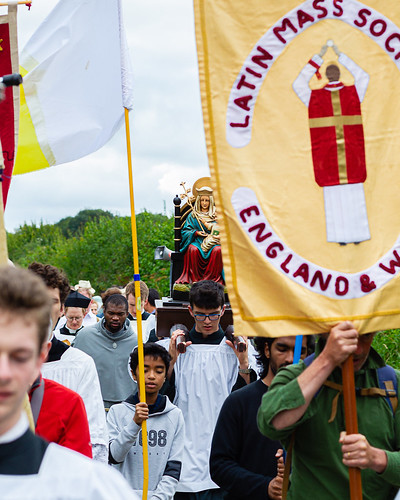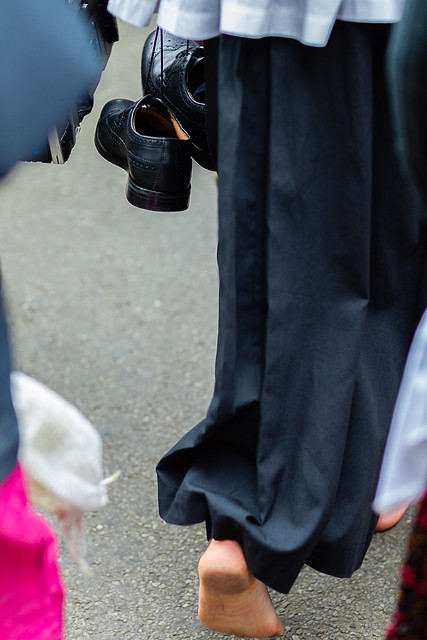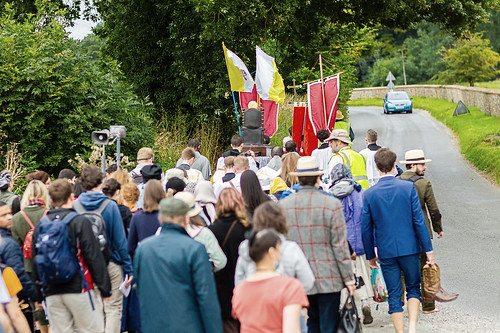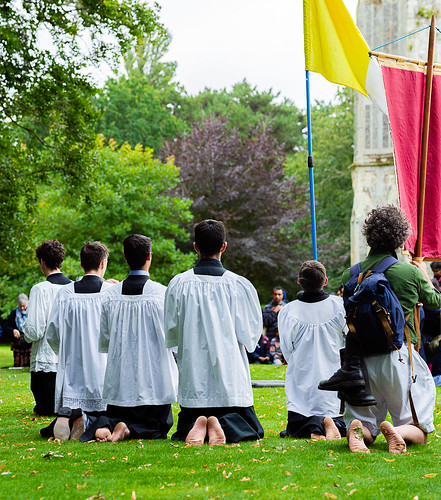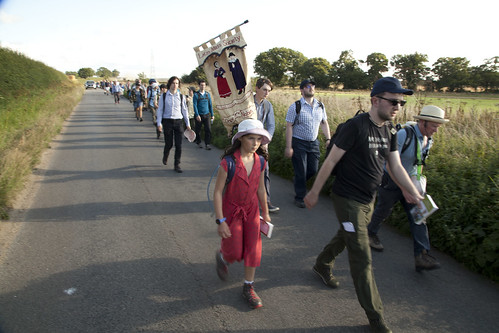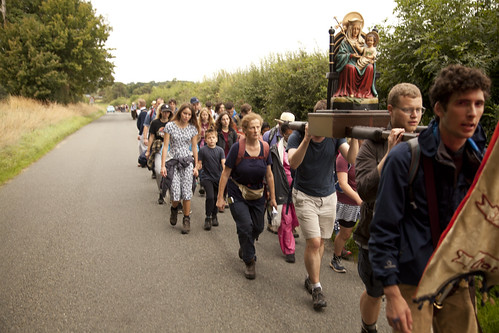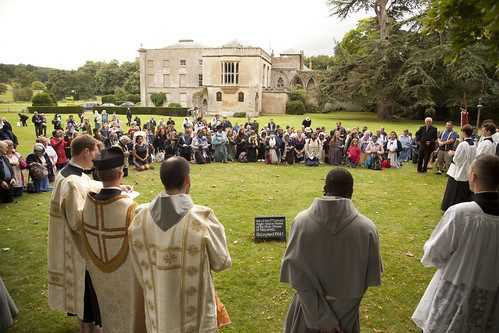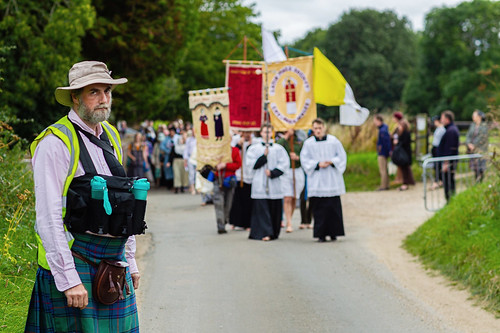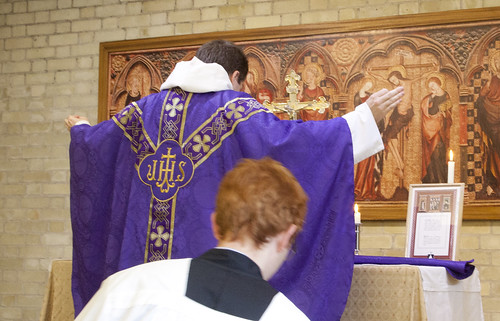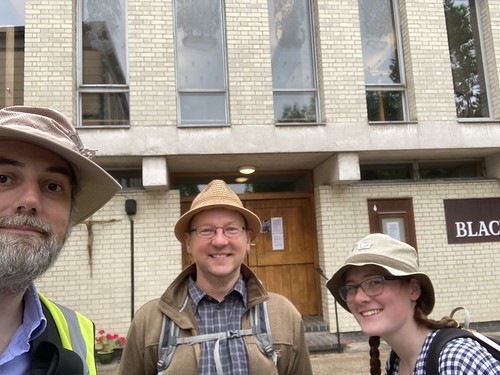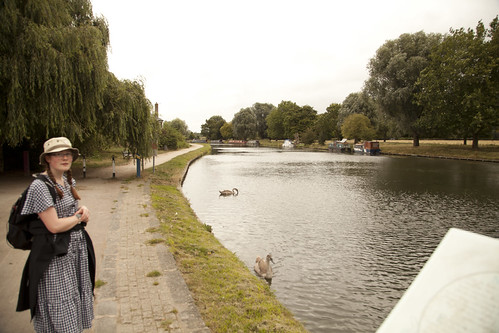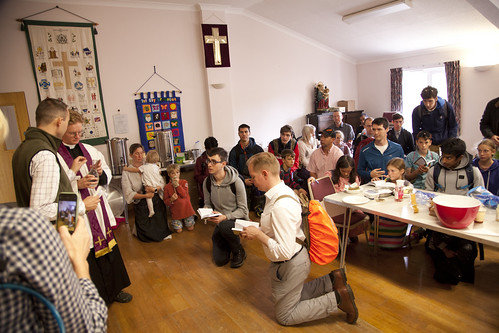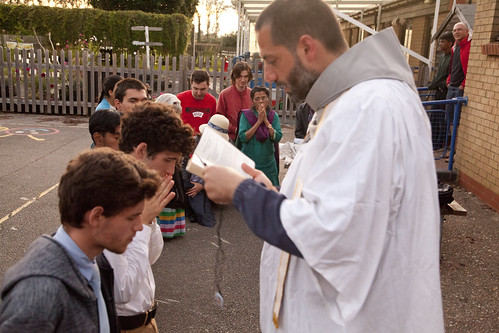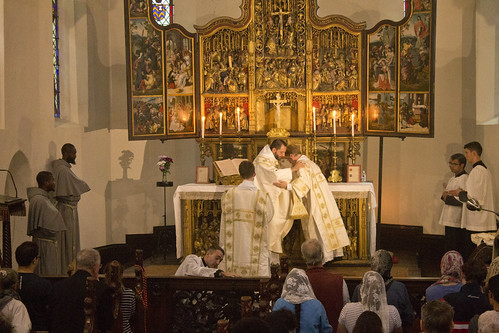Chairman's Blog
Introductory video from the Guild of St Clare
Statement of the Religious Superiors (and Taylor Marshall)
Monday Masses at Maiden Lane: professionally-led singing returns
We are now back, and last night we had the first Mass with the newly formed Southwell Consort. This is led by Dominic Bevan and consists mainly of men and women with musical training who have chosen not to pursue music as a career. It is an opportunity for them to sing some lovely sacred music in the liturgical setting for which it was composed. Last evening they had a whopping 17 singers. They sang Missa O Quam Gloriosum, Victoria; Ave Maria a 8, Victoria; Panis Angelicus, Rebelo, and I must say (hearing this from the sanctuary where I was serving) it was extremely impressive.
Next week, the Houghton Schola will return: also to be led regularly by Dominic Bevan, this is an all-male group singing Gregorian Chant, for singers of all levels of experience.
The next Monday evening Mass will be a High Mass, a Votive of the Blessed Sacrament, part of the series of Masses in London linked to the Eucharistic Congress taking place in Hungary. In honour of the occasion the Houghton Schola will be joined by some polyphonists.
LMS Walsingham Pilgrimage: more photos
LMS Walking Pilgrimage to Walsingham, Part 2
The little girl in red managed the entire walk, 56 miles over three days.
Our fantastic non-walking volunteers, on Saturday evening in Great Massingham.
Some of the tents at Great Massingham.
Dinner at Great Massingham Village Hall.
That evening we enrolled four members of the LMS' servers' guild, the Society of St Tarcisius.
Walking on Sunday morning, accompanied by the processional statue.
The final Mass of the Pilgrimage, in the Catholic Shrine in Houghton St Giles. The medieval shrine at Walsingham was of course destroyed by Henry VIII; the restored Catholic shrine today is based around a medieval 'slipper chapel', a wayside pilgrims' chapel, the last on the route and the marker of the Holy Mile to the shrine proper. The larger church there, the 'Reconciliation Chapel' pictured above, is always a challenge to photograph, but this year we filled it, with a congregation of about 350. This included many people who joined us by car and coach, and also people who just happened to be at the shrine, including many Syro-Malabar Catholics and Travelers.
So after Mass we form up again, with many more people than before, and walk the Holy Mile singing the Rosary and the Te Deum.
We arrive at what is left of Walsingham Priory, which once housed the Holy House. This represented the house of the Annunciation in Nazareth, and was established at the command of Our Lady herself on the eve of the Norman Conquest.
There we venerated the processional statue we had brought with us and received the special blessing of returning pilgrims from the Roman Ritual.
The following morning, those of us who have stayed the night locally squeeze into the Slipper Chapel for a Sung Mass.
LMS Walking Pilgrimage to Walsingham: Photos, Part 1
Contradictions among those defending Traditionis Custodes
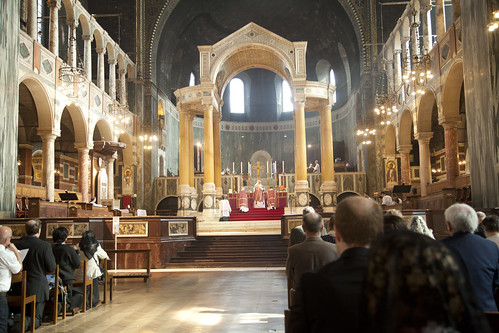 |
| Final blessing at the High Mass in Westminster Cathedral; Mass for the Latin Mass Society's AGM |
My latest on 1Peter5: on some conflict among those who defend Traditionis Custodes.
Pope Francis has offered two reasons for wishing to bring celebrations of the Traditional Mass to an end: attitudes of some of the faithful which have become associated with this form of the Mass, and the idea that the unity of the Church requires a unity of liturgical rite. Accordingly, some of his defenders have focused on one of these points, and some on the other. Both are having difficulty explaining and justifying Pope Francis’ action.
I recently fisked an article by Michael Sean Winters which laid the blame for Traditionis Custodes (TC) on the people who like it, singling out the journalist Michael Brendan Dougherty. There is much wrong with Winters’ argument, but suppose he was right about Dougherty being a dangerous schismatic, what would be the significance of this? To be crass about it, who cares what some journalist thinks? If he were the head of an organization, clerical or lay, with serious popular support, which was closely associated with the TLM, that might indicate a wider problem, but as it is, it proves nothing at all.
As if realizing that he needed to widen his evidence base, towards the end of his article Winters brings in Martin Mosebach, accusing him of rejecting Vatican II without being able to quote him doing so, and the views of George Weigel, apparently unaware that Weigel has a long and distinguished history of gratuitouslyinsulting Catholics attached to the Traditional Mass. As a representative of the movement, he doesn’t really fit the bill. Nevertheless, that’s the best Winters can come up with.
Another problem with this approach is identified by Terrence Sweeney on the Where Peter Is blog, and in fact is acknowledged even by Winters himself: in Sweeny’s words, “Even if many are acting schismatically, this does not justify a restriction that affects those who attend the Tridentine rite but remain faithful.”
Read it all there.
Is Traditionis Custodes calling for more Latin?
 |
| High Mass in Westminster Cathedral for the Latin Mass Society. Photo by John Aron |
Cross-posted from Rorate Caeli.
A number of American writers claim that Traditionis Custodes should spur priests to make their celebration of Mass more reflective of the liturgical tradition. Others commentators, including a number of bishops implementing it, apparently think the opposite.
Those in favor of the first interpretation can cite a couple of passages from the Letter to Bishops which accompanied Traditionis Custodes. Pope Francis quotes Pope Benedict complaining about liturgical abuses—“unbearable distortions”; later he remarks:
Whoever wishes to celebrate with devotion according to earlier forms of the liturgy can find in the reformed Roman Missal according to Vatican Council II all the elements of the Roman Rite, in particular the Roman Canon which constitutes one of its more distinctive elements.
The Roman Canon being Eucharistic Prayer I in the reformed Missal.
The two most influential American blogs defending Traditionis Custodes, Pray Tell and Where Peter Is, have accordingly taken this line. Fr Anthony Ruff of the Pray Tell blog writes:
The goal is that the entire Roman rite celebrates the liturgy of Vatican II in all the spiritual profundity and sacrality which remains to be discovered in the 1970 Missal, so that there is less reason for people to seek out the 1962 alternative.
Terrence Sweeney on Where Peter Is calls for more celebrations of the Novus Ordo in Latin and with “proper liturgical garments, fully celebrated liturgies, processions, and yes smells and bells,” a celebration that is “richly traditional”.
By contrast, the bishops who have been most prominent in implementing Traditionis Custodes are not encouraging their priests to make their celebrations of Mass any closer in spirit to Traditional Mass: quite the contrary. The Bishops Conference of Costa Rica, for example, in what seems like an inversion of Pope Francis’ words about continuity quoted above, warn against “any element coming from the ancient form”. One bishops has actually suspendeda priest for celebrating the Novus Ordo in Latin.
One American diocese, Rockford, Illinois, whose Vicar General Monsignor Eric Barr has written defending Traditionis Custodes, in 2017 bannedpriests from celebrating the Novus Ordo facing east, facing same direction as the congregation, in the traditional manner, despite this being permitted by the rules of the Novus Ordo.
The French bishops, whose reporton the spread of the Traditional Mass in their dioceses became public early this year, felt that “when elements are introduced into the OF they are more sources of tension than of enrichment.” What sort of “elements” did they have in mind?
Use of old vestments, and the use of black as a liturgical color. The adding of Signs of the cross. Veiling of statues in Passiontide. Blessing of the water at the Offertory. The sacring bell, communion plates.
In the Novus Ordo the bell is explicitly allowed as a “local custom” and black “where it is the practice” (General Instruction of the Roman Missal 150 and 346 respectively); the use of the Communion plate (paten) is actually required (Redemptionis Sacramentum 93).
The use of the more traditional options which exist in the Novus Ordo is sometimes called “the reform of the reform”. Fr Ruff and others like him think that this is more important than ever, because it show the continuity between the reformed Mass and the earlier liturgical tradition; liturgically progressive bishops, on the other hand, think that the reform was right to relegate these practices to the status of mere options, and thinks the actual use of these options is a retrograde step.
Pope Francis has, in fact, made his own position quite clear. He famously brokethe liturgical rules by washing the feet of a Muslim female on Maundy Thursday in 2013. Whatever one thinks of his action, it did not give an example of strict adherence to norms.
In 2015 he was reported as follows, after a long meeting with the priests of Rome:
The Pope noted that there are priests and bishops who speak of a “reform of the reform.” Some of them are “saints” and speak “in good faith.” But this “is mistaken”, the Holy Father said.
In 2016 he reacted negativelyto Cardinal Robert Sarah’s encouragement of the celebration of Mass facing east. Earlier this year priests were bannedfrom celebrating individual Masses in St Peter’s in Rome, and forced to concelebrate in Italian instead.
Taking all this into account, there is no justification for reading Traditionis Custodes as a call for making celebrations of the Novus Ordo more traditional. On the other hand, the Traditional Latin Mass is still allowed wherever a local bishop gives permission. Indeed, the only way for a priest to celebrate an individual Mass, or a Mass in Latin, at St Peters’ side altars, is now in a limited number of slots allocated to the Traditional Mass. Pope Francis and his allies among the bishops seem to prefer a situation in which the Traditional Mass is the only alternative to progressive-style Novus Ordo celebrations. This polarization of liturgical options has precisely the effect feared by Fr Ruff: it gives people greater reason to seek out the Traditional Mass. Pope Francis’ liturgical policies may in the end do more to promote attendance at the Traditional Mass than to discourage it.
Latin: not as dead as you think, on Catholic Answers
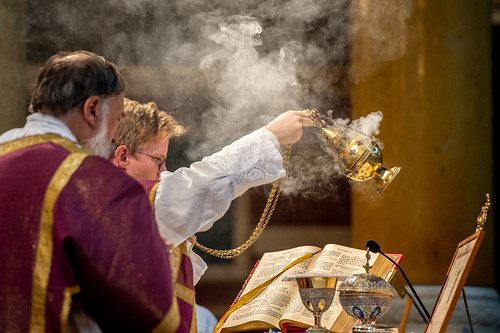 |
| Fr Henry Whisenant insensese the Altar in Westminster Cathedral: Annual Mass for the Latin Mass Society |
From an early date, the Church in the West has used Latin—not only for administration, study, and communication, but for prayer. This was natural for regions where Latin was the majority language, but as the centuries passed, the Western Church persisted with a Latin liturgy in evangelizing peoples on and beyond the edges of the Roman Empire not conversant with it, such as the North African speakers of Punic and the speakers of Celtic and Germanic languages in western and central Europe. By contrast, the Eastern Churches sometimes made use of the languages of their new converts, even when these had to be specially developed in their written forms for this to be possible, as with Ethiopia’s Ge’ez and Russia’s Church Slavonic.
There is thus a close association between the Western Church and the Latin language. Even today, when the liturgy can be celebrated in a huge range of languages, this relationship has left its mark, and Latin remains an option for both public and private prayer—not only in celebrations of the pre-Vatican II liturgy, but also for the reformed Mass.
Why has the Church been so attached to Latin? The answer is that liturgical Latin is not just a convenient language, but a sacred language.
The LMS' London chant schola, the Houghton Schola, will return to singing in September
 |
| Corpus Christi, Maiden Lane, London |
Cross-posted from the Gregorian Chant Network blog.
It has been a long winter for Gregorian Chant, but we can finally announce that the Houghton Schola, the Latin Mass Society's all-male training schola for London, will resume rehearsing and singing in September.
They will be singing at Corpus Christi Maiden Lane, two Monday evening Masses a week, and as a rule they will have one rehearsal a month to prepare both Masses, in the office of the LMS itself, which is in Macklin Street, Holborn.
To register your interest in singing, please email southwell@lms.org.uk
The Director, Dominic Bevan, is also leading a new, mixed, polyphonic consort, the Southwell Consort, which you can also enquire about through this address.
The Houghton Schola trains chant singers who may or may not have previous experience. The Southwell Consort provides an opportunity to sing in a liturgical setting for people with musical training but who have not become professional musicians.
The first rehearsal of the Houghton Schola will be on Friday 10th September.

